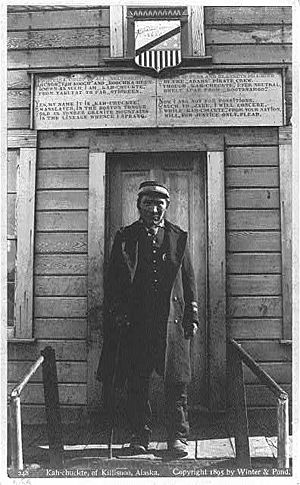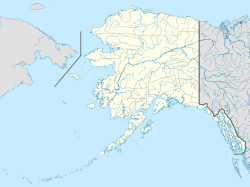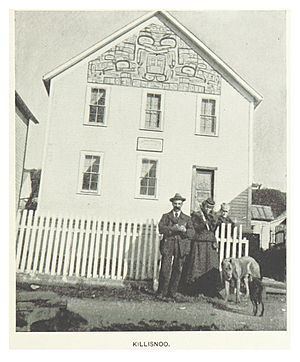Killisnoo, Alaska facts for kids
Quick facts for kids
Killisnoo
|
|
|---|---|

Chief of Neltusken
|
|
| Country | United States |
| State | Alaska |
| Census Area | Hoonah-Angoon |
| Elevation | 16 ft (5 m) |
| Time zone | UTC-9 (Alaska) |
| • Summer (DST) | UTC-8 (Alaska) |
| GNIS ID | 1423064 |
Killisnoo was a small, unincorporated community located on Killisnoo Island in Alaska. It was near the town of Angoon on Admiralty Island. Killisnoo had its own post office for a while, but it closed in 1930. People sometimes called the community by other names, like Kanas-nu or Killishoo.
Contents
A Look Back at Killisnoo
Killisnoo Island has been home to the Tlingit people for a very long time. The Tlingit are a group of Native Alaskans.
The Fish Plant and Community Life
In the late 1800s, a company called the North West Trading Company built a large plant in Killisnoo. This plant processed fish, turning them into useful products. Many Tlingit people from nearby Angoon and other areas moved to Killisnoo to work at this plant. It became a lively place with many families.
Fires and Changes
Sadly, a big fire destroyed the fish processing plant in 1928. After this fire, most of the people who lived in Killisnoo moved away.
Before that, in 1927, the St. Andrew Church in Killisnoo also burned down. The church members then built a new church, called St. John the Baptist church, in Angoon.
Weather and Modern Use
Killisnoo gets less rain than many other parts of southeastern Alaska. Today, there is a place called Whaler's Cove Lodge on Killisnoo. It is a popular spot for hunting and fishing trips.
Who Lived in Killisnoo?
| Historical population | |||
|---|---|---|---|
| Census | Pop. | %± | |
| 1890 | 79 | — | |
| 1900 | 172 | 117.7% | |
| 1910 | 351 | 104.1% | |
| 1920 | 256 | −27.1% | |
| 1930 | 3 | −98.8% | |
| 1940 | 26 | 766.7% | |
| U.S. Decennial Census | |||
The first time Killisnoo appeared on the U.S. Census was in 1890. A census is like a big count of all the people living in a place. In 1890, 79 people lived there. Even though it was a Tlingit village, the census showed that more white people lived there (44) than Tlingit people (33), plus 2 people of Asian descent.
The number of people living in Killisnoo grew until 1910, when it reached 351 residents. After the big fire in 1928, the population dropped a lot. By 1930, only 3 people were counted. The community continued to be listed on the census until 1940. Later, Killisnoo became part of the nearby city of Angoon.
 | Janet Taylor Pickett |
 | Synthia Saint James |
 | Howardena Pindell |
 | Faith Ringgold |



